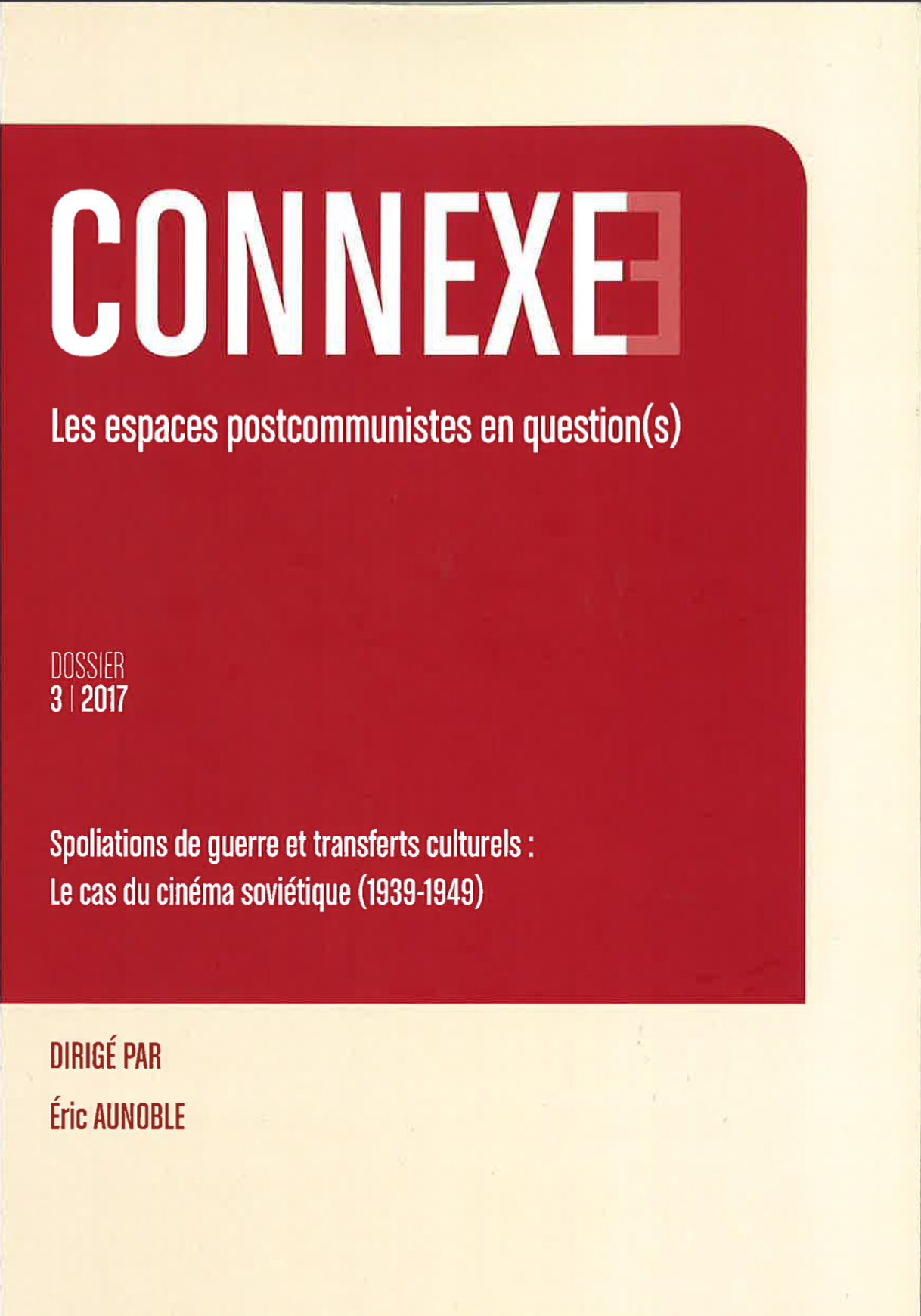Was the Left’s Thunder Stolen? Soviet Short Films on British Wartime Screens
DOI :
https://doi.org/10.5077/journals/connexe.2017.e90Mots-clés :
Propagande, Seconde Guerre mondiale, Cinéma soviétique, Histoire du cinéma, Relations anglo-soviétiquesRésumé
Après l’attaque nazie contre l’Union soviétique en juin 1941, le Royaume-Uni connaît une véritable vague d’intérêt et de soutien envers le nouvel allié soviétique contre les nazis. Le gouvernement britannique commence à aider les Soviétiques, mais il est largement suspecté de ne pas en faire assez. Le ministère de l’Information essaye de contrer cette impression en affichant le soutien officiel à la Russie, tout en faisant le nécessaire pour que ce soutien reste sous le contrôle du gouvernement et ne devienne pas l’apanage des communistes britanniques. Alors que la recherche académique s’est beaucoup intéressée à la dimension diplomatique des relations anglo-soviétiques pendant la guerre, on a peu écrit sur l’aspect culturel de la question ainsi que sur la propagande qui jouaient pourtant un rôle crucial ; de même, les études sur le cinéma en Grande-Bretagne pendant la guerre ont accordé peu d’attention aux films soviétiques. Néanmoins, au début de l’alliance anglo-soviétique, les courts métrages s’avèrent un moyen de communication privilégié d’une politique gouvernementale britannique fort complexe quant à la Russie soviétique : l’impression d’immédiateté et d’authenticité plaisait au public, alors que le gouvernement y voyait la courroie de transmission fiable d’un message calibré. Ainsi l’analyse de quelques films clés (Salute to the Soviet, 100 Million Women) permettra de voir si la prétention du ministère de l’Information d’avoir réussi à voler la foudre de la gauche est justifiée. Nous pourrons également montrer les effets de cette politique sur la société britannique.
Références
Anon, “New Documentary Films,” Documentary News Letter, 1942, n°3 (1), pp. 4-6.
Bell P[hilip] M. H., John Bull and the Bear: British Public Opinion, Foreign Policy and the Soviet Union 1941-1945, London: Edward Arnold, 1990.
Black Jeremy, Rethinking World War Two: The Conflict and its legacy, London - New York: Bloomsbury Academic, 2015.
Brandenberger David, National Bolshevism: Stalinist Mass Culture and the Formation of Modern Russian National Identity, 1931-1956, Cambridge, MA - London: Harvard University Press, 2002.
Branson Noreen, History of the Communist Party in Britain 1941-1951, London: Lawrence and Wishart, 1997.
Brigadnov P. A., “Letter to Andrievskij and Bol’šakov,” in Valerij Fomin (ed.), Kino na vojne: dokumenty i svidetel’stva, Moscow: Materik, 2005, p. 643.
Chapman James, The British at War: Cinema, State and Propaganda, 1939-1945, London - New York: I. B. Tauris, 1998.
Churchill Winston S., The Second World War, 6 vols, London: Cassell, 1948-1954, Vol. 3: The Grand Alliance (1950).
Eden Anthony, The Eden Memoirs, 3 vols, London: Cassell, 1965, Vol. 2: The Reckoning. Fenby Jonathan, Alliance: The Inside Story of How Roosevelt, Stalin and Churchill Won One War and began Another, London - New York: Simon and Schuster, 2006.
Fox Jo, Film Propaganda in Britain and Nazi Germany: World War II Cinema, Oxford - New York: Berg, 2007.
Grierson John, “Summary and Survey,” in Forsyth Hardy (ed.), Grierson on Documentary, London: Fabet and Faber, 1966, pp. 164-186.
Hicks Jeremy, “The International Reception of Early Soviet Sound Cinema: Chapaev in Britain and America,” Historical Journal of Film, Radio and Television, 2005, n°25 (2), pp. 273-289.
Kapterev Sergej, “Otnošenie amerikanskogo kinematografa perioda vtoroj mirovoj vojny k sovetskomu sojuzniku,” in Obraz vojny na ekrane (na materiale fil’mov i arhivnyx dokumentov stran-učastnic vtoroj mirovoj vojny), Moscow: VGIK, 2015, pp. 264-287.
Knight Claire, “The Making of the Soviet Ally in British Wartime Popular Press,” Journalism Studies, 2013, n°14 (4), pp. 476-490.
Krylova Anna, Soviet Women in Combat: A History of Violence on the Eastern Front, Cambridge and New York: Cambridge University Press, 2010.
MacLaine Ian, Ministry of Morale: Home Front Morale and the Ministry of Information in World War II, London: George Allen and Unwin, 1979.
Maisky Ivan, Memoirs of a Sovet Ambassador: The War 1939—43, Translated by Andrew Rothstein, London: Hutchinson, 1967.
Maisky Ivan, The Maisky Diaries: Red Ambassador to the Court of St James, Translated by
Tatiana Sorokina and Oliver Ready, New Haven - London: Yale University Press, 2015. Manvell Edith, “Women and Propaganda,” Documentary News Letter, 1942, n°4, vol. 3, p. 59. Miner Steven Merritt, Stalin’s Holy War: Religion, Nationalism, and Alliance Politics, 1941—1945, Chapel Hill - London: University of North Carolina, 2003.
Obinger Herbert and Carina Schmitt, “Guns and Butter?: Regime Competition and the Welfare State during the Cold War,” World Politics, 2011, n°63 (2), pp. 246-270.
Rose Sonya O., Which People’s War? National Identity and Citizenship in Britain 1939-1945, Oxford: Oxford University Press, 2003.
Ross Graham (ed.), The Foreign Office and the Kremlin: British Documents on Anglo-Soviet
Relations 1941-45, Cambridge: Cambridge University Press, 1984. Soames Mary, Clementine Churchill, Harmondsworth: Penguin, 1981.
Stalin Josif, “Telegramma I. V. Stalina — I. M. Majskomu, 30 August 1941,” in D. K. Bogatyrev (ed.), I. V. Stalin: Pro i kontra. Antologija. Obrazy sojuznikov-pobeditelej v kul’turnoj pamjati o Vojne 1941-1945 gg., pp. 639-640. St Petersburg: Russkaja Hristianskaja Gumanitarnaja Akademija, 2015, pp. 639-640.
Thorpe Frances, Nicholas Pronay and Clive Coultass, British Official Films in the Second World War: A Descriptive Catalogue, Oxford and Santa Barabara, CA: Clio Press, 1980.
Volkov Fedor, SSSR — Anglija 1929-1945 gg.. Anglo-sovetskie otnošenija nakanune i v period vtoroj mirovoj vojny, Moscow: Meždunarodnye Otnošenija, 1964.




